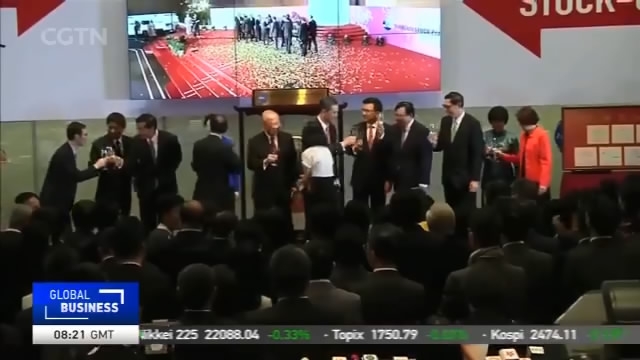
18:54, 23-Apr-2018
HK-Mainland Stock Connect: Foreign investors welcome daily quota boost
03:01

Foreign investment into China could be about to soar. China's central bank governor Yi Gang has announced that daily trade quotas via Hong Kong's Stock Connect programs with Shanghai and Shenzhen will be quadrupled from May first. That's ahead of Chinese A Shares' inclusion in MSCI's Emerging Market Index in June. How excited are foreign investors, and what does that mean for markets in the mainland and offshore? Joel Flynn takes a look.
When the Hong Kong-Shanghai Stock Connect was opened back in 2014, few might've guessed the extent of its reverberations. Just four years on, the $10.6 trillion combined capitalisation of cross border trade makes it the second largest stock market in the world. And it's about to get even bigger. The PBOC has announced plans to quadruple daily limits on trade into and out of the Chinese mainland from May 1st. Foreign investors are excited. Northbound trade from Hong Kong into Shanghai and Shenzhen will rise to $8.3 billion as a result of this quota rise.
FRANCOIS PERRIN, PORTFOLIO MANAGER EAST CAPITAL "It's not an investment proposal that you can get access to in any other stock exchange of financial markets elsewhere, so it's really helping you to build a stronger portfolio that are closer to the economic reality of Chinese economic growth."
Analysts are also highlighting the greater opportunities for Chinese investors. Southbound trade via Hong Kong will now be capped at a lower level of $6.7 billion per day, but domestic demand for international capital markets is soaring. Plans announced this month are for a new connect scheme between London and Shanghai to come on stream by the end of the year. How Beijing reacts to that could be crucial.
CRAIG ERLAM, SENIOR MARKET ANALYST OANDA "We've seen capital controls being put in place when it comes to the stock market, something foreign investors are not used to, and will be strongly against, so if these are imposed at a time when the market's opening then this will naturally turn investors or some of the more risk averse investors away from the Chinese markets."
JOEL FLYNN CGTN REPORTER "Hong Kong itself meanwhile could be remain a vital part of Chinese markets for some time yet as well. Despite regulatory pressure in the city, and growing competition with mainland bourses, many see Hong Kong's role as a complementary one."
XIA LE, CHIEF ECONOMIST FOR ASIA BBVA RESEARCH "China is trying to establish the rule of law, but it takes time, and also if we check the infrastructures, I mean the soft infrastructures in Hong Kong, they have this reputation as an international financial sector for quite a long time."
Despite these concerns though, risks are widely still seen as minimal. Indeed, even at a time when many are fretting over the impact of a looming trade war with Washington, Beijing's macroeconomic background for investors looks strong, with GDP numbers showing surprising strength this week.

SITEMAP
Copyright © 2018 CGTN. Beijing ICP prepared NO.16065310-3
Copyright © 2018 CGTN. Beijing ICP prepared NO.16065310-3